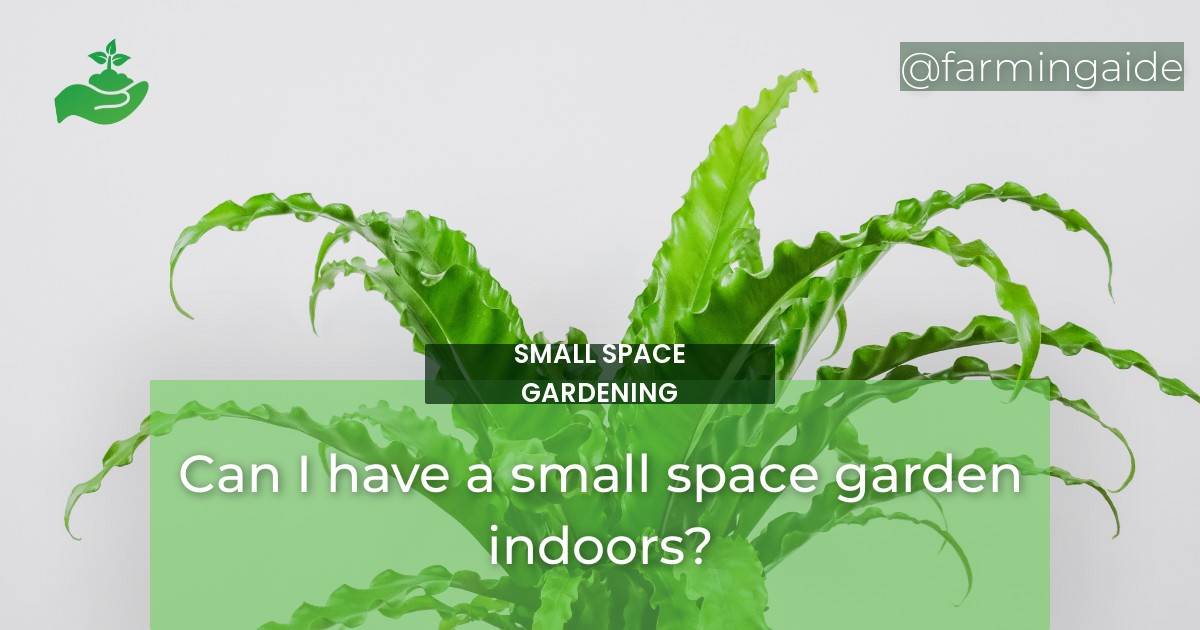Yes, you can have a small space garden indoors, and this is a great way to grow plants in limited spaces. Indoor gardening in small areas, especially in urban areas, has become popular due to the lack of outdoor space and the benefits of having plants inside the house. There are several benefits to having an indoor garden, such as growing fresh produce, improving indoor air quality, and enhancing the aesthetic appeal of your home.
Benefits of Indoor Gardening in Small Spaces
Access to Fresh Produce
Indoor gardening is an excellent way to grow fresh produce, such as herbs, vegetables, and fruits, all year round. You can grow herbs like basil, rosemary, thyme, and vegetables like tomatoes, lettuce, and peppers, even if you don’t have access to outdoor space. This means you can enjoy homegrown produce that is free of pesticides and other chemicals.
Improved Indoor Air Quality
Indoor plants are known to improve air quality by absorbing harmful toxins, such as benzene and formaldehyde, from the air. Plants release oxygen into the air and help to create a more healthy and natural environment in your home.
Aesthetic Appeal
Having plants indoors adds an aesthetic appeal to your home. Plants bring life and color to a room and create a relaxing and peaceful atmosphere.
Growing Plants Indoors in Limited Space
Ideal Plants for Indoor Gardening
Choosing the right plants for indoor gardening is essential. Plants that grow well indoors include herbs like basil, chives, mint, parsley, and thyme. Other plants to consider include spider plants, peace lily, English ivy, and Chinese evergreens. Succulents and cacti are also great choices, especially for those who have limited space.
Choosing the Right Containers for Indoor Plants
The right container is crucial for indoor plants. Containers should have good drainage and be the right size for the plant. Consider using hanging baskets, wall planters, or even mason jars for smaller plants.
Proper Lighting for Indoor Plants
Lighting is essential for indoor plants. Most plants require at least six hours of sunlight per day. If you do not have access to natural light, consider using artificial lighting, such as LED grow lights.
Soil and Fertilizer Considerations for Indoor Plants
Choosing the right soil and fertilizer is important for indoor plants. Use a high-quality potting mix that contains peat moss and vermiculite. Fertilize your plants every two weeks with a balanced fertilizer.
Watering and Maintenance of Indoor Plants
Watering indoor plants can be tricky. Overwatering can lead to root rot, while underwatering can cause the plant to wilt. Most indoor plants require watering once a week, but this can vary depending on the plant and the environment. Regularly check the moisture level of the soil to determine when to water your plants.
ALSO READ
Creative Ideas for Small Space Indoor Gardening
Vertical Gardening
Vertical gardening is a great way to maximize space. Consider using wall-mounted planters or hanging baskets to grow your plants vertically. You can also create a living wall by combining several wall-mounted planters.
Terrariums
Terrariums are mini indoor gardens enclosed in glass containers. They are perfect for small spaces and require minimal maintenance. You can create a terrarium using succulents, moss, and other small plants.
Herb Gardens
Herb gardens are perfect for small spaces, and you can grow them indoors all year round. Plant your herbs in small containers and place them on a windowsill or countertop where they can receive plenty of sunlight.
Miniature Gardens
Miniature gardens are tiny indoor gardens that can be created in any container. You can use small containers like teacups, mason jars, or even eggshells to create your miniature garden. Add small plants, rocks, and other decorations to create a tiny, beautiful garden.
Conclusion
Indoor gardening in small spaces is an excellent way to grow plants and enjoy the benefits of gardening even if you don’t have access to outdoor space. With the right plants, containers, lighting, and care, you can create a beautiful indoor garden that adds an aesthetic appeal to your home. So why not give indoor gardening a try and enjoy the benefits of having fresh produce, improved indoor air quality, and a relaxing atmosphere in your home?


